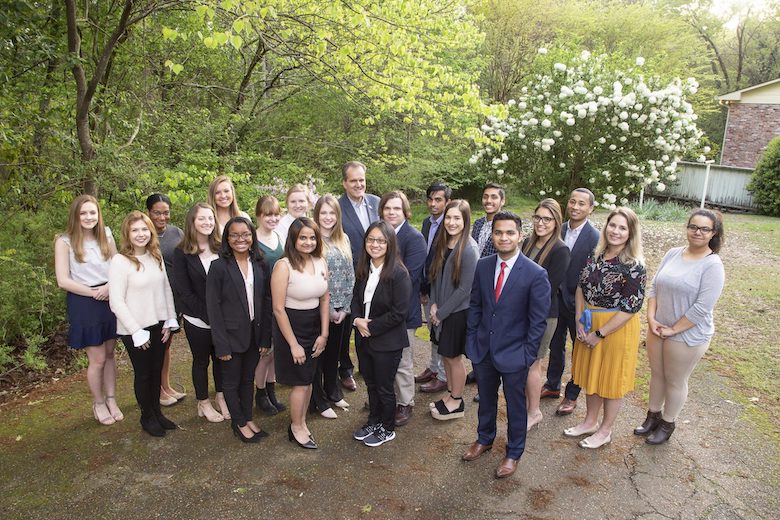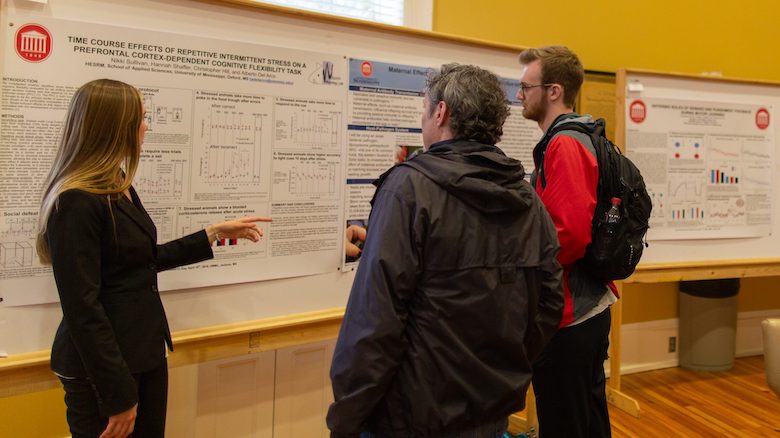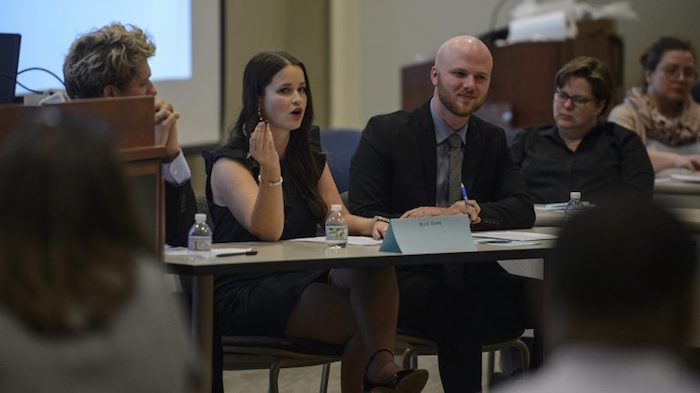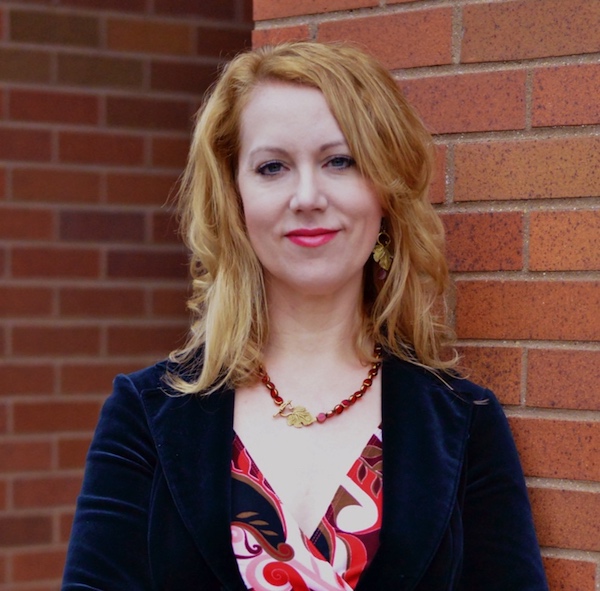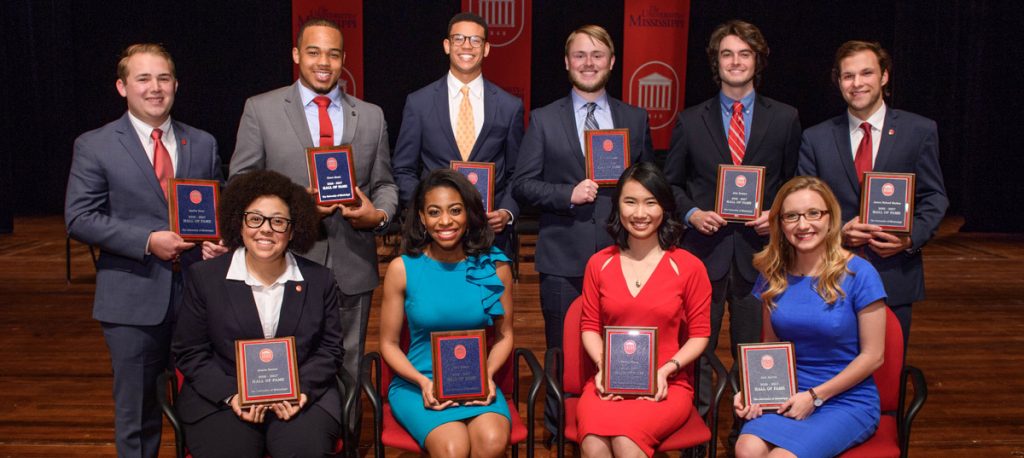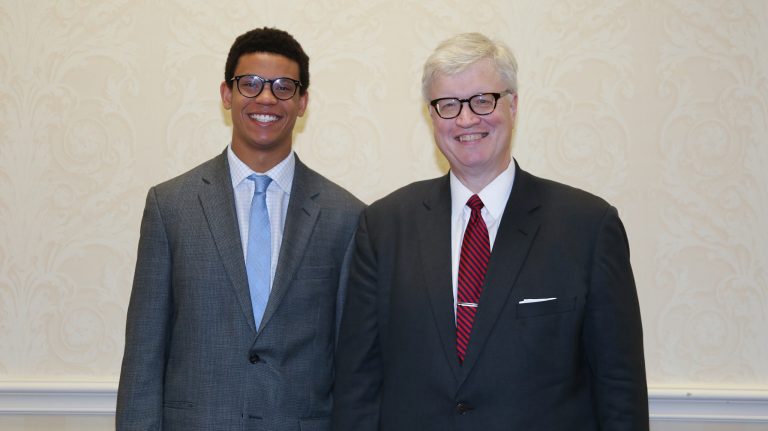A look at a few of the 5,327 scholars in the College of Liberal Arts

From left: Dylan Ritter, Miller Richmond, Rachel Anderson, Alex Martin, and Austin Powell.
Rachel Anderson, BA Spanish and BAJ Journalism ’17
The most defining of the rigorous challenges and invaluable opportunities of Rachel’s college experience — producing the Mississippi Department of Transportation’s first bilingual hurricane guide as a public affairs intern, blogging about her semester in Bilbao, Spain, for Study Abroad, interning in Florence, Italy—was competing as a member and leader of UM’s Speech and Debate Team.
“Debate enabled me to further pursue my passion for foreign language and culture. I’ve watched Spanish language competitions, trained in my second language, and introduced international exchange students to the activity. Debating for the university fused my studies, helping me practice my public speaking and poise for broadcast journalism while bolstering my Spanish fluency.”
As managing editor of the University of Mississippi Undergraduate Research Journal — a yearly peer-reviewed publication founded by students for students with a mission to recognize excellent work, Alex recruited articles and was involved in outreach about what publishable research looks like and how undergraduates can get involved in research activities.
“I am interested in pursuing a career in economic research — particularly macroeconomics and international development. As a summer intern in the Office of Economic Policy in the Department of the Treasury in Washington, DC, I liked economic research and analysis in practice. This led me to seek a position at the Federal Reserve Board of Governors, where I started work this fall as a research assistant in the Economic Research division.”
Teaching entrepreneurial and leadership development at the Marshall County Correctional Facility provided insight for Austin’s Honors thesis, “Entrepreneurial Correctional Education in the Criminal Justice System,” and will be useful as the Rhodes Scholar finalist pursues a master’s degree in criminology at the University of Oxford in England.
“My goal is to return and raise the quality of life for Mississippians by developing an in-depth understanding of criminology and the criminal justice system, how different entities can become community partners in Mississippi, and how the state can take partial ownership of the solution. My research will focus on the disconnects that lie between empowering offenders in the entrepreneurial class and the reality of low post release employment opportunities.”
Miller Richmond, BA international studies ’17
Miller completed the global health emphasis with a Croft/Honors thesis, “An Investigation of the Integration of Education and Mental Health Treatment into the Care of Diabetes in Syrian Refugee Women,” an expansion of his research abroad—interviews and surveys with refugees, the United Nations High Commission for Refugees, Jordanian Ministry of Health officials, and doctors. He developed ethnographic research skills studying the health house model in Mississippi with Kate Centellas, Croft associate professor of anthropology and international studies.
“Returning from Jordan, I collaborated with Dr. Centellas; Dr. John Green, director of the Center for Population Studies and associate professor of sociology; and Emma Willoughby (BA liberal studies and sociology ’14) to form a Global Health research group that led to a working paper, ‘Epistemic Prejudice and Health Inequalities: The Case of Mississippi.’”
Dylan Ritter, BS chemistry ’17
One of UM’s six inaugural Stamps Scholars and the American Chemical Society Outstanding Inorganic Chemistry Student, Dylan conducted genetics research at Texas A&M University, in Ireland at a pharmaceutical lab where his performance earned him an opportunity for independent research with a multinational company, and in a lab associated with the University of California at Davis that integrated his earlier work from Texas.
“During those summers, I realized how much I enjoy research and found a new career path in the sciences. The experiences were so rewarding that my post-undergraduate plan shifted from medical school to graduate school for a PhD in biomedical science.”
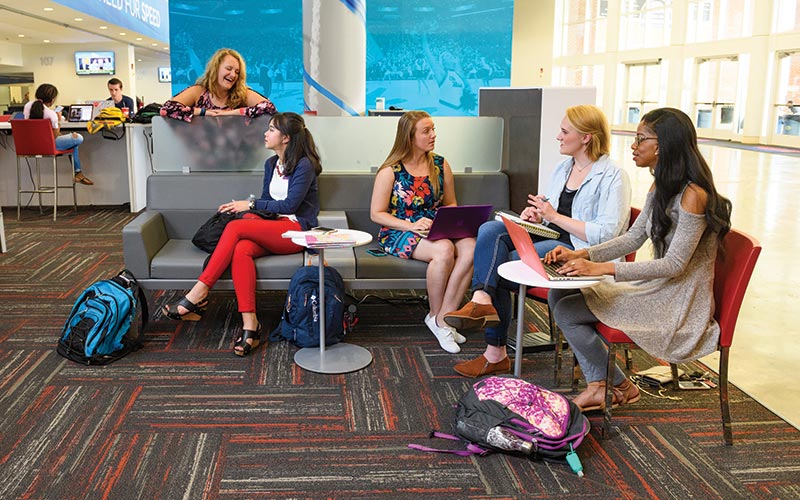
From left: Melanie Culhane, Jiwon Lee, Elizabeth Taylor, Alicia Dixon, and Johnnay Holt.
Melanie Culhane, BM music – vocal performance ’17
A musician and performer active in UM’s choral programs, Opera Theatre, and Living Music Resource, Melanie received first place in the 2016 National Association of Teachers of Singing State Competition Senior Women Category for four musical selections — an Italian aria from Mozart’s Le Nozze di Figaro, the French song “Chanson d’amour” by Faure, a German piece by Schumann, and, in English, “I Hate Music” by Bernstein.
“Although I was nervous, I relied on my preparation and the knowledge I had obtained in all of my academic classes and practice sessions, and gave great performances for the judges.”
Establishing UM’s Archaeological Ethics Bowl team set Alicia’s career path: “Because of this experience, I want to practice Cultural Heritage law.”
“Classics Professor Hilary Becker’s Who Owns the Past? course opened my eyes to issues facing the preservation of antiquities and problems that arise when pieces of the past can be bought and sold. Since then, two fellow students and I have learned what the law says about historic preservation and the standards for ethical excavation, trade, and repatriation. We have debated complex cases to stretch our understanding of how antiquities — and the people they represent — should and should not be treated. A general Ethics Bowl team we started with Philosophy Professor Deborah Mower will continue to compete after we graduate.”
“I’m interested in how politics affects our lives, and how it helps create our profound democracy. My political science studies and research have increased and broadened my intellectual capacities to analyze ethical issues, cultural diversity, and service to others through both knowledge based theory and hands on experience. Moreover, being a political science major has fostered and developed within me a firm foundation and greater understanding of the methodology and practices of public policy to guide me as a future law school student.
“My career goal is to one day run for public office and actively meet the needs of my community.”
Jiwon Lee, BM music ’17
The double major in violin and flute performance is principal flute in the University Wind Ensemble, a first violin member of the orchestra, a drum major for The Pride of the South marching band, a member of the basketball pep band, and a featured soloist playing the National Anthem at baseball, basketball, and softball games.
“I am grateful for the experiences I have had at Ole Miss. One could never have dreamed that a little girl from Daejeon, Korea, would be standing in front of thousands of people conducting a college band or playing solos with the University Wind Ensemble. Thank you, Ole Miss family!”
Elizabeth Taylor, BA sociology ’18
As a transfer student from Grayson County College and an international officer of Phi Theta Kappa Honor Society, Elizabeth earned acceptance into the UM Honors College where she is the first person in its junior entry program to receive a Barksdale Award — $5,000 for a dream project of study, research, or humanitarian effort. “In Dublin, Ireland, I interviewed employees of a nonprofit that provides services to survivors of sex trafficking and prostitution. By creating an organizational ethnography of Ruhama, I want to figure out how to create similar nonjudgmental social, psychological, and infrastructure support in the US. I am extremely grateful for the encouragement I have received since transferring to Ole Miss. I would list names, but there are truly too many to count.”
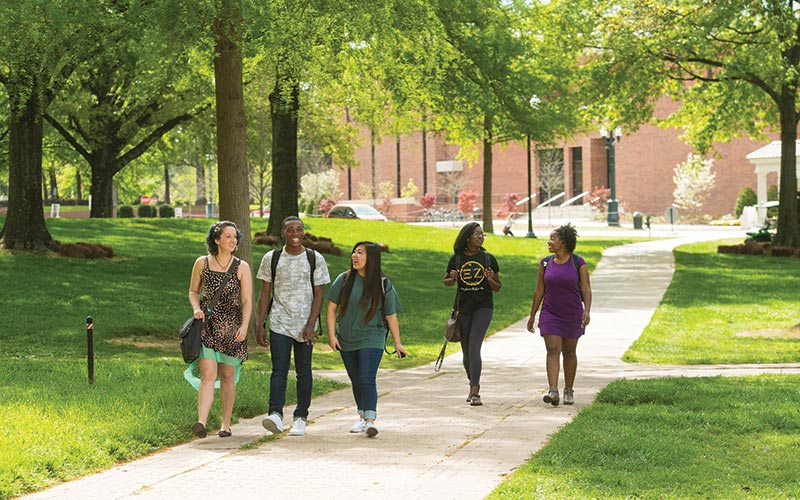
From left: Jessica Richardson, Cellas Hayes, Thuy Le, Tiara Mabry, and Ebonee Carpenter.
Ebonee Carpenter, BA sociology ’17
Before she transferred from Hillsborough Community College, Ebonee was International President of Phi Theta Kappa honor society for community colleges. Her work at the international level continues at UM with trips to Mexico and Zambia. In Mexico, she helped install water purification units with H2OpenDoors, a project of the Peninsula Sunrise Rotary Foundation. In Zambia, she conducted research on food security, health, and nutrition in a summer field school with Anne Cafer, assistant professor of sociology. The UM Office of Global Engagement and a US State Department Gilman Scholarship supported Carpenter’s field school work.
“The program was a unique opportunity to immerse myself in African culture while conducting research on the impact of food security and education on the growth and social development of local communities.”
Cellas Hayes, BA biology and classics ’19
The summer after Cellas’ freshman year, he traveled to Rome to take Ancient Italy in Context, a month-long classics course. Cellas spent his sophomore summer with scientists at the Bialystok University of Technology in Poland conducting research on fungi in the Bialowieza Forest, one of Europe’s oldest forests and a hotspot of biodiversity. He was one of four UM students accepted for the internship to study in Poland offered by the National Science Foundation International Research Experience for Students program.
“I am ecstatic to compare research differences in the US and Europe and to enhance and expand my education in more ways than just attending class. This university is the university for opportunity and has taught me to be genuine, be relateable, and build my life on being different.”
Thuy Le, BA biochemistry ’17
The Mississippi Gulf Coast Community College transfer student conducted biomedical research with the UM Medical Center (UMMC) Cancer Institute as a summer scholar. Beyond the internship, Thuy studied drug therapies and their effects on triple negative breast cancer in the UM research laboratories of Yu-Dong Zhou, research associate professor of chemistry and biochemistry, and Dale Nagle, professor of bimolecular sciences.
“The Frate Fellowship in Bioethics and Medical Humanities offered by the UMMC, UM Department of Philosophy and Religion, and Honors College challenged me in ways I never imagined. We discussed food insecurities, social determinants of health, organ transplantation, and dialysis. The controversial topics pushed me out of my comfort zone, and the fellowship taught me the importance of difficult ethical discussions and the emphasis of the humanities in medicine.”
Tiara Mabry, BA psychology and nursing ’17
“My grandmothers work with the mentally handicapped, in a women’s hospital, and for a battered women and children’s shelter. The desire to help others runs deep in my family.”
To continue her family tradition of service and prepare for a career as a Certified Nurse Midwife and Women’s Health Nurse Practitioner, Tiara took advantage of the resources offered through UM’s Grove Scholars, an intensive program encouraging and facilitating academic success and job placement among Mississippi resident STEM majors who are also Ole Miss Opportunity Scholars. She developed leadership skills and enhanced her interpersonal skills as Grove Scholars president, Green Grove ambassador, UM NAACP secretary, MOST mentor, and Sigma Gamma Rho sorority vice president.
“Make sure the things you are involved in are the things you are invested in.”
Jessica Richardson, BFA art, imaging arts ’17
The leader of the student-run Clicks Club offering lectures, museum trips, and group photo shoots also developed and led workshops providing technical information on cyanotypes and lighting.
“The Clicks workshop series teaches students of all areas and experience levels about the various aspects of photography. We emphasize hands-on experience while sharing information about other artists to study. My role as president allowed me to hone my networking and organizational skills through planning these workshops, which has helped prepare me for a career in the arts.”
Award-Winning Graduate Students
Each year College of Liberal Arts departments present Graduate Student Achievement Awards at Honors Day. These six represent scholars across the discipline areas housed in the College.
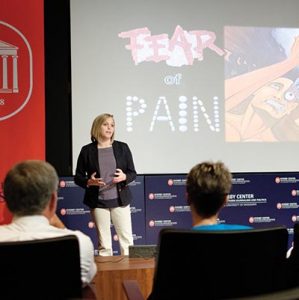
Anna Katherine Black
Doctoral winner of UM’s Three Minute Thesis Competition challenging graduate students to explain their research in three minutes and using only one slide, Anna Katherine’s dissertation is “An Experimental Manipulation of Fear of Pain in Migraine.”
Recipient of the Research Achievement Award in Psychology, she has four publications in peer-reviewed journals and a book chapter in press with Scientific American–Neurology. Black, UM’s Psychological Services Center Assessment Services Coordinator, plans a clinical work career delivering therapy to clients who struggle with mental health difficulties.
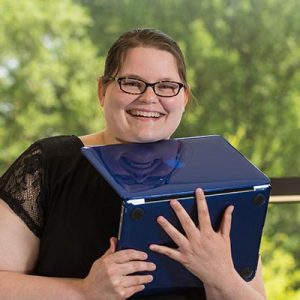
Katelyn Dreux
KATELYN DREUX
PhD chemistry ’17
Katelyn’s graduate research experience includes the application of sophisticated quantum mechanical methods to study small, noncovalently bound clusters and also the investigation of physical properties of moderately-sized molecules and clusters of unusual inter- or intra-molecular interactions using density functional theory. Her dissertation is “Probing Atypical Non-covalent Interactions Using Electronic Structure.”
She presented her research results at three regional and national meetings and published four papers during her time at UM.
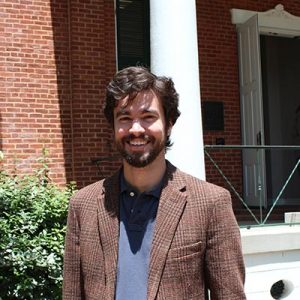
Josh Green
Josh’s undergraduate honors thesis on the end of prohibition in Mississippi was so good that The Mississippi Encyclopedia editors asked him to write the essay on the topic for the book.
Josh obtained a law degree from Tulane University and practiced law in New Orleans before returning to Oxford to pursue a master’s in Southern Studies, where he won the first-year paper prize for “Peace and the Unsealing of the Mississippi Sovereignty Commission Files.”
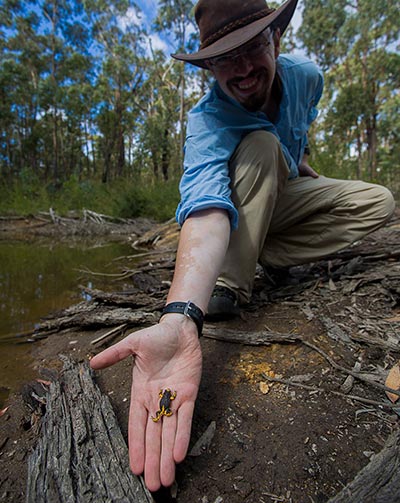
Justin “JP” Lawrence
JUSTIN “JP” LAWRENCE
PhD biology ’18
JP works in Biology Professor Brice Noonan’s lab exploring the evolution of warning coloration in poison frogs of the Neotropics. His most recent success securing research funding is an Australian Endeavour Fellowship to spend five months with a new collaborative group in Australia.
JP’s goal is to establish an independent research program focused on the ecology and evolution of aposematic species and the process of speciation.
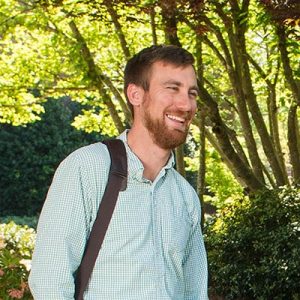
John Lindbeck
JOHN LINDBECK
PhD history ’18
“Slavery’s Holy Profits: Religion and Capitalism in the Antebellum Lower Mississippi Valley” is John’s dissertation exploring the relationship between capitalist markets, religious faith, and the institution of slavery in the antebellum Southwest.
“I am especially interested in the economic foundations of proslavery evangelical denominations, as well as white Southerners’ faith that God’s Providence guided markets and commercial networks in the slave-based cotton kingdom.”
He presented “Missionary Cotton: Saving Souls in Mississippi’s Cotton Kingdom” at the 2017 Southern Historical Association annual meeting and wrote his master’s thesis on Anti-Mission Baptists, Religious Liberty, and Local Church Autonomy.
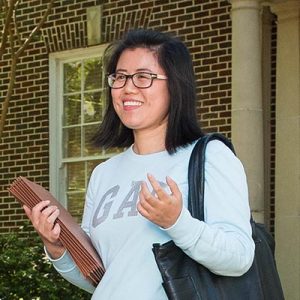
Feng Liu
Feng has developed a new test of predictive accuracy for macroeconomic applications and written elaborate programs to generate results for the new test—working as a full research partner with Economics Professor Walter Mayer and Mathematics Professor Xin Dang. Their paper interpreting the results has been accepted for publication by the International Journal of Forecasting.
As lead author on another paper, Feng simplified Economics Professor John Conlon’s asset-price bubble models—previously the simplest available. “My models have been cited in the Journal of Economic Theory—the top field journal on the subject, the Review of Economic Studies, and Econometrica,” Dr. Conlon said. “And I’m sure that her model will be significantly more influential than mine.”

